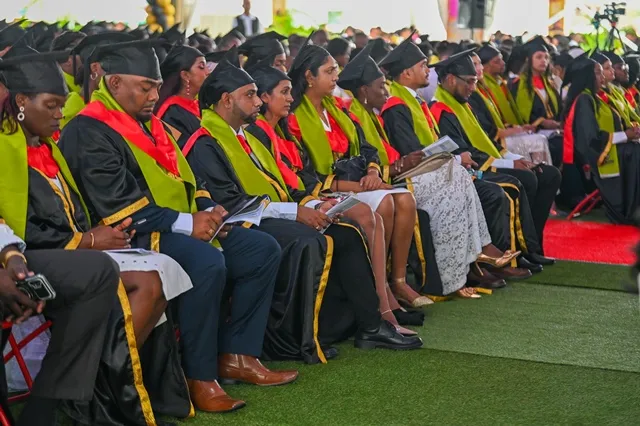TIMEHRI, GUYANA – As the engines of KLM’s Airbus A330 roar into life on the Cheddi Jagan International Airport (CJIA) runway, they do so powered by Guyanese hands. In a landmark development for the country’s aviation and energy sectors, GUYOIL Aviation Services Inc. (GASI) has secured a jet fuel supply contract with KLM Royal Dutch Airlines, becoming the official fuel partner for the Dutch carrier’s new direct flights between Amsterdam and Georgetown.
The deal, announced as KLM commenced operations in Guyana this week, marks more than just a business agreement—it’s a symbol of Guyana’s growing presence in global aviation and commerce.
From Local Refiner to Global Supplier
GASI, a subsidiary of the state-owned Guyana Oil Company, has steadily developed its infrastructure and standards since its formation in 2015. The company now boasts IATA-certified facilities, capable of meeting the rigorous fuel safety and handling requirements of top-tier international airlines.
“This contract is a validation of our standards, our systems, and our people,” said Molly Hassan, General Manager of GUYOIL. “It proves we can match global expectations while proudly flying the Guyanese flag.”
GASI will provide Jet A-1 fuel on an “into-plane” basis, directly refueling KLM’s aircraft at CJIA on their twice-weekly service—Wednesdays and Saturdays. The airline will rely on GUYOIL for the large fuel volumes required for the nine-hour transatlantic return journey to Amsterdam.
Infrastructure Backing the Ambition
The contract wouldn’t be possible without significant behind-the-scenes upgrades. To support long-haul aircraft, GASI has expanded its fuel storage, acquired new refueling bowsers, and streamlined delivery systems. The upgrades form part of a broader push under the PPP/C administration to modernize CJIA as both a passenger and logistics hub.
These investments complement ongoing CJIA enhancements, including a planned second terminal, expanded commercial areas, and automated e-immigration gates. Airport CEO Ramesh Ghir confirmed that passenger throughput has surged, and the airport is scaling to meet demand.
“What we’re seeing now is Guyana preparing for the traffic of tomorrow—not just managing the needs of today.”
Strategic Timing, Broader Impact
KLM’s entry comes at a time when Guyana’s economic profile is rising, driven by the energy sector and supported by deliberate state policies to diversify. For the government, this contract adds weight to a larger narrative: that Guyana is open, investable, and increasingly connected to the world.
Public Works Minister Juan Edghill, whose portfolio includes aviation, called the KLM route “a breakthrough” in reducing travel barriers between Guyana and Europe. Until now, travelers often faced multiple transits to reach destinations like Amsterdam, Rotterdam, or even Paris. With KLM’s network of over 150 European destinations, the flight is a game-changer.
And the GUYOIL contract means that Guyana’s own enterprises are part of that journey—not just passengers, but providers.
Economic and Diplomatic Value
The benefits aren’t just technical. GUYOIL will now earn in foreign currency, potentially generating millions annually. The contract also has spillover effects—supporting employment in fuel operations, airport services, and tourism-linked sectors.
Diplomatically, this deal reflects deepening Guyana–Netherlands ties, following President Irfaan Ali’s 2024 official visit to The Hague. Dutch firms are already active in Guyana’s offshore oil sector—like SBM Offshore, and now Dutch aviation joins the fold. The deal hints at a multi-layered partnership: trade, energy, tourism, and logistics.
A State Entity on the Global Stage
That GUYOIL—traditionally associated with local gas stations—now fuels a flagship European airline speaks to institutional growth and public-sector evolution.
Under previous governments, GUYOIL’s aviation footprint was limited. But since 2020, with strategic backing and modern management, GASI has expanded to serve airlines like American, Copa, and Caribbean Airlines. The KLM deal, however, is its most prestigious to date.
“This is no longer just about Guyana being served,” one industry analyst noted. “It’s about Guyana doing the serving—on equal terms.”
Looking Ahead
The challenge now is operational consistency. KLM’s schedule runs tight, often coordinating with regional partners like Suriname’s SLM. Any delay in fueling could disrupt turnaround times. GASI is aware of the stakes and has reportedly trained additional personnel and implemented stricter quality control protocols for this account.
If the route performs well, flight frequency could increase, and with it, GUYOIL’s supply volume. Other European carriers may also take notice, possibly opening the door for future contracts. Virgin Atlantic and regional partners like InterCaribbean are reportedly assessing expansion into Guyana.
For now, KLM’s inaugural refueling on CJIA’s tarmac—handled smoothly by a Guyanese crew—stands as a quiet milestone. It doesn’t make headlines globally, but it matters deeply at home.
Conclusion: A Global Link, Fueled Locally
As Guyana’s presence on the world stage grows, stories like this one matter. They show that global connectivity isn’t just about who flies in—it’s about who powers the journey. With this contract, GUYOIL isn’t just a fuel provider—it’s a symbol of national capability.
“We see this not just as a transaction,” said Hassan, “but as a step in Guyana’s transformation. We’re ready for the world.”
And now, with each KLM takeoff from Timehri, that transformation has lift-off.
Region: Timehri / National Infrastructure / Aviation
Sources: Newsroom.gy, GUYOIL press release, CJIA statements, INews Guyana, Government of Guyana remarks.




